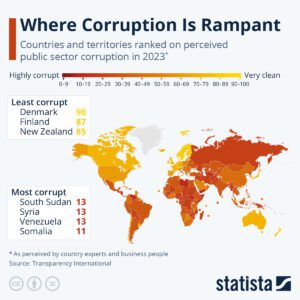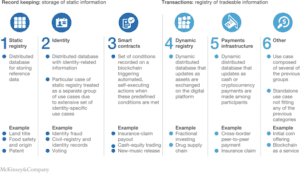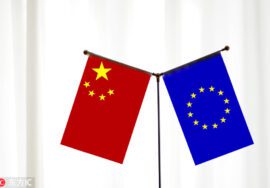

How to prevent corruption and ensure transparency through Blockchain?


Opinion by:arsim@thejournalbiz.com
The lesser-known part of the Bitcoin phenomenon is the decentralized digital database known simply as the blockchain.
Blockchain, among other things, can serve as a perfect tool to fight the endemic corruption that has plagued many countries turning them into zombie states like, or ‘banana republics’ as often referred to these places scattered all over the world.
Statista chart on Global Corruption


Statista chart
These countries are often known for their economic crises, which almost always end up with a ‘brain drain’ or mass migration.
Worldwide, bribery alone is estimated to cost tens of billions of dollars in losses annually, while corruption takes a far greater toll, according to the IMF study on ‘Corruption: Costs and Prevention Strategies’
This study argues that corruption discourages private investment, hinders economic growth, and encourages mass migration.
To clarify and define corruption, any abuse of public funds for personal gain through fraud or bribery, by senior officials or otherwise, is lawfully classified as an act of corruption.
We have many cases that we can refer to, whenever we critically elaborate the ‘endemic corruption’ thesis, from Zimbabwe to Venezuela, but the recent one in Albania speaks volumes about the phenomenon of corruption in the Western Balkan Region.
That said, unfortunately, Kosovo and Albania have been plagued by this negative phenomenon which extends from the municipal administration all the way to the office of the Prime Minister and beyond.
Table on Blockchain activity by MckInsey


Mckinsey: Blockchain
This year alone, dozens of MPs and even the former President of Albania have been arrested for abuse of position and corruption, news that shocked the local press and international observers.
The irony of all this is not because the ex-president has been arrested on charges of corruption by the SPAK, (the special anti-corruption unit) but because the Albanian judiciary needed an independent anti-corruption unit to act on many abuses that the local courts neglected for years, exposing the degree of political interference.
Romania and Croatia had identical cases to solve as a pre-condition before joining the EU.
In Kosovo, the situation is the same if not worse, and what all Balkan countries have in common is the abuse of public funds, nepotism, and appalling approach towards innovation.
Blockchain, or the decentralized digital database is an innovation that could assist them on their way towards EU integration, by fighting corruption first and attracting foreign investors at the same time.
According to the World Economic Forum (WEF), the digitalization of services through blockchain is an innovative initiative for which developed countries are making appropriate preparations for their mass application.
Not coincidentally, Estonia is known for its rapid digital transformation, by fostering innovation and fighting political corruption at the same time.
Kosovo could easily do the same if the blockchain was implemented. In this way they could attract foreign investors and curb migration, while corruption issues would be a thing of the past, and here’s why;
– Blockchain provides security with public contracts, as it increases transparency and data cannot be changed or deleted once recorded there.
– Blockchain is an easily accessible application, a database where contracts signed between public and private entities can be observed, who won, who bided, and what were the conditions.
Since corruption tends to happen through tendering procedures, blockchain is one of the most efficient tools we have to combat this phenomenon.
In sum, there are 2 fundamental key issues that contribute to an environment where inequality grows rampant:
- lack of ownership mechanism and government instability, where Blockchain technology can provide the tools and
- opportunities needed for those suffering from inequality to tackle those fundamental issues.
In short, blockchain can serve not only as an anti-corruption tool, but also as an antidote to nepotism and abuse that has engulfed public administration turning it into a rehabilitation center, or the ‘headquarters of parasites’ as the saying goes.
No wonder corruption thrives in countries with fragile democracies and where politics is the preferred choice to acquire illegal wealth while sabotaging the well-being of their own people.
Driven by poverty, unemployment, and corruption, more than a third of Albania’s population has emigrated in the past 20 years, while over 300 thousand Kosovan citizens migrated, according to the IOM.
Statistics do not seem to bother local politicians to act and mitigate the ‘brain drain’ phenomena.
While the European Commission continues pouring funds dedicated to “reforms” for the Balkan countries. Instead of insisting on accountability for their prior funds, which ironically tend to end up in the pockets of corrupt officials, (as we have the case with the former Minister of Health in Albania)
It is no wonder why abuses of public funds have accelerated, because we have zero accountability from individuals who belong behind bars more than their claim that can deal with state funds.
We may recall the recent scandal where Kosovo lost over 22 million euros in arbitrage and the possibility of building a new power plant, while no one explained whatsoever to what exactly happened.
No wonder we have political forces completely immersed in corrupt affairs, and what remains an effective tool no one cares to consider, nor has the courage to speak publicly, and that is our topic of elaboration today Blockchain technology, which remains easy and very efficient to implement, but there has to be a collective will and determination to do so.








